Photographs: Rupak De Chowdhuri/Reuters Business Standard
Across Delhi, taps have run dry.
Water shortages in the scorching weeks just before the monsoon hits the national capital are not unknown; but there is little question that this year they have been more than normally acute.
Nor, unfortunately, is Delhi's situation unusual.
While it perhaps suffers more than others -- being located, after all, in a semi-arid climatic zone -- cities in other parts of India also experience such scarcity annually.
A recent World Bank report ranked Delhi and Chennai as the worst-performing metropolitan cities in terms of water supply among 27 big Asian cities.
. . .
Why Delhi's taps are running dry this summer
Image: A child drinks water.Photographs: Rupak De Chowdhuri/Reuters
This is in spite of the fact that this problem is both predictable and preventable.
The causes are simple and straightforward: mismanagement of water, coupled with its wasteful use, and the unchecked degradation of water bodies.
Instead of addressing these issues, city administrations most often try to put the blame elsewhere.
The Delhi government, for instance, conveniently accuses neighbouring Haryana of curtailing water releases in the river Yamuna.
The audit report of the Delhi Jal Board, meanwhile, seems to suggest that inequitable distribution of water is partly responsible.
. . .
Why Delhi's taps are running dry this summer
Photographs: Reuters
Delhi, and most other cities, evolved around assured sources of water -- rivers, ponds or underground water aquifers.
But skyrocketing demand and the gradual decline of these sources have led to a yawning water deficit.
In Delhi, well over a third of water is reportedly lost to leaky pipes.
Scandalously, ponds have been allowed to be converted into plots of land for construction of buildings.
. . .
Why Delhi's taps are running dry this summer
Photographs: Toby Melville/Reuters
Worse, they have lost their water catchment areas to construction or concreting.
Rivers close to cities are made unusable because untreated sewage is pumped into them.
Underground water, meanwhile, is being over-extracted, far exceeding its replenishment.
Even if rainfall is sufficient to meet demand, there is no effort to ensure that it reaches the aquifer, as larger and larger stretches of India's cities are paved or concreted over, causing valuable water to pool and evaporate instead of filtering down to the aquifer.
Given the problems, the solutions are obvious -- the preservation of water bodies, for example, including through better sewage treatment, and increasing the efficiency of distribution networks, if necessary through privatisation.
. . .
Why Delhi's taps are running dry this summer
The truth is that average annual rainfall is, for most of India -- some well-marked arid and drought-prone belts apart -- sufficient to meet demand, if rainwater was not allowed to run wastefully.
The main solution for augmenting water availability, therefore, is water harvesting. Compliance with existing water-harvesting regulations is appalling, and most municipalities don't even bother enforcing them.
Meanwhile, unplanned urban growth has left little scope for rooftop water harvesting, especially in densely inhabited localities, since the collected water is apparently too little to justify the investment.
. . .
Why Delhi's taps are running dry this summer
Image: A farmer walks with his hungry cow through a parched paddy field.Photographs: Jayanta Dey/Reuters
However, large housing and other building complexes should at least be harnessed.
On the other hand, the vast stretches of public land under footpaths and parks offer an ideal opportunity for rainwater harvesting.
Instead of concretising pavements, cities should try covering them with small tiles with sufficient gaps in the paving to allow water to percolate downwards.
Civic authorities should stop blaming everyone else for problems they themselves have caused and allowed to continue.

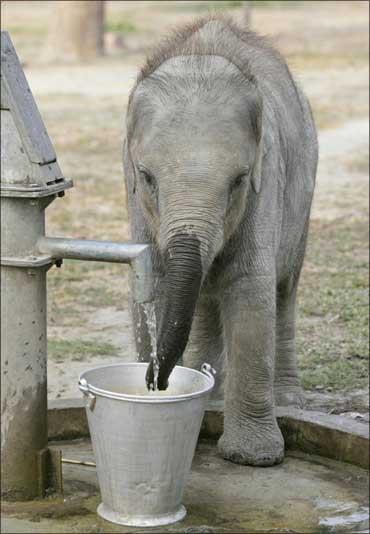
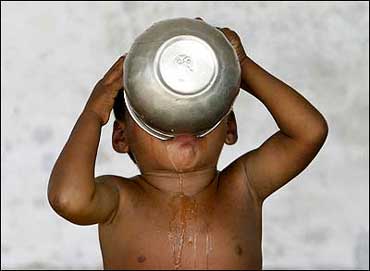
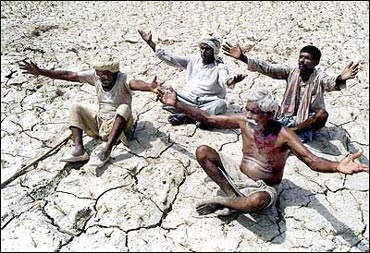
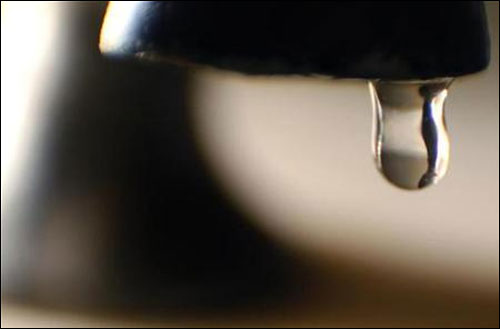
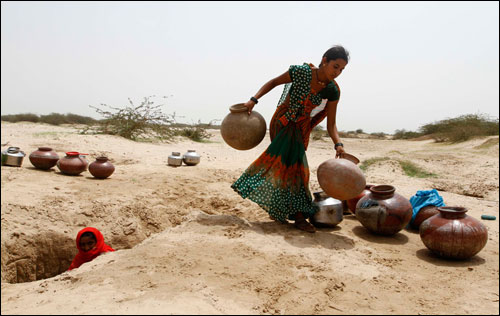
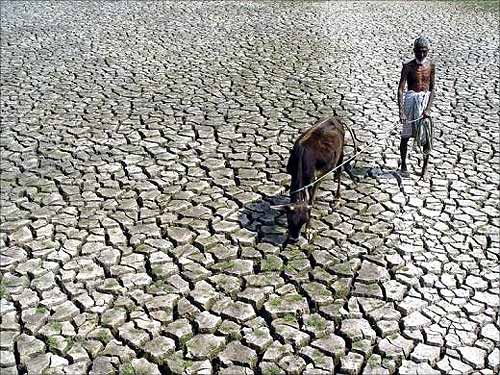

article